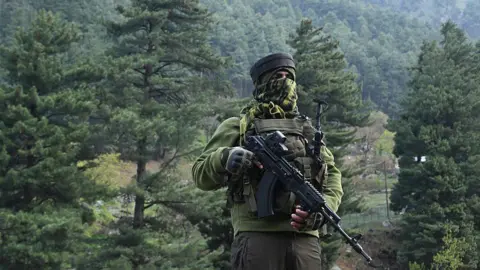In a developing situation fraught with tension, Pakistan has raised alarms about a possible military confrontation with India. Pakistani Information Minister Attaullah Tarar stated that there is “credible intelligence” indicating that India is poised to undertake a military strike within the next 24 to 36 hours. This warning comes on the heels of a horrific attack in Indian-administered Kashmir, where militants fatally shot 26 tourists last week, leading to accusations of Pakistani complicity from Indian authorities.
The gravity of the claim from Pakistan is significant, reflecting the longstanding animosity that has often resulted in military skirmishes between the nations. Tarar’s assertion suggests that India intends to use the recent attack as a “false pretext” to justify a military response against Pakistan. He further warned that any aggressive actions taken by India would meet with a decisive response from Pakistan, highlighting the high stakes in this crisis-laden context.
This assertion by Pakistan has added to the already existing apprehensions surrounding the region. The attack near Pahalgam, a popular tourist destination, has been described by many as the deadliest on civilians in the territory in two decades. Kashmir continues to be a highly contentious area; both India and Pakistan stake claims over it and have clashed militarily over its possession in the past. The recent violence also raises questions about the stability of the region and the likelihood of further escalation in military engagements.
As hostilities have flared, Indian and Pakistani troops have engaged in sporadic small-arms fire across the border. Speculation is rife regarding whether India will resort to military strikes as it did in previous instances following similar assaults, notably in 2016 and 2019. In the weeks following the attack, Indian authorities have detained over 1,500 individuals for questioning, ostensibly as part of a wider crackdown on suspected militants. Although the details surrounding these detentions remain unclear, they underscore the urgency with which Indian officials are responding to the crisis.
In addition, Indian authorities have started demolishing the homes of at least 10 individuals alleged to have links with militancy, indicating a strategy aimed at an aggressive posture against perceived threats. The complexities of the insurgency in Kashmir are part of a larger narrative of conflict; since 1989, the region has grappled with an armed insurgency against Indian governance, with militant groups regularly targeting both security personnel and civilians.
Amid this turmoil, it remains uncertain who is responsible for the Pahalgam attack. Although an obscure group termed the Resistance Front initially claimed the assault, it later distanced itself from the charges. This group has connections to the highly notorious Lashkar-e-Taiba, a militant organization based in Pakistan that has been implicated in several high-profile attacks. Indian police have identified three of the four suspected militants, revealing that two of them are Pakistani nationals and one is local to Kashmir, while no information is available regarding the fourth suspect.
This situation has incited great anger in India, with Prime Minister Narendra Modi vowing to pursue the perpetrators relentlessly. This declaration of intent adds a layer of pressure on the already strained relations between the two nuclear-armed neighbors, intensifying fears around the potential for miscalculations.
To succinctly summarize the situation, significant tension between Pakistan and India has been brought to the fore with accusations of complicity in a recent terrorist attack, accompanied by credible intelligence reports suggesting military action is imminent. The events unfolding in Kashmir, a region mired in decades of conflict, once again highlight the fragile state of peace in South Asia and the complicated dynamics between these two historically antagonistic nations. The international community’s eyes are fixed on this potential flashpoint, awaiting developments that could have wider implications for regional security.



